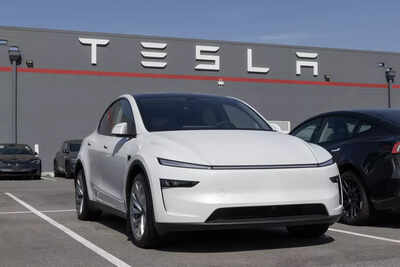ARTICLE AD BOX

Tesla’s U.S. market share fell to an eight-year low in August as buyers shifted to newer EV models from rivals, Cox Automotive data showed.
Tesla's dominance in the American electric vehicle (EV) market is waning as a growing number of rivals erode the company's once-unassailable lead, according to exclusive data shared with Reuters by research firm Cox Automotive.
Tesla marketshare in America falls below 40% for the first time ever
The data reveals that Tesla's U.S. market share plummeted to a near eight-year low in August, falling below 40% for the first time since October 2017. Tesla, which once commanded over 80% of the U.S. EV market, accounted for just 38% of total EV sales last month.According to a Reuters analysis of Cox data, Tesla's market share in July fell to 42% from 48.7% in June, marking the sharpest drop since March 2021, when Ford launched its Mustang Mach-E EV.
What's hurting Tesla
The decline highlights a critical challenge for Tesla: its aging product lineup. While competitors are aggressively launching new models and increasing incentives, Tesla's most recent vehicle, the Cybertruck pickup, has not matched the success of its earlier models like the Model 3 and Model Y. A recent refresh of the Model Y, once the world’s best-selling car, has failed to meet expectations, putting the company on track for a second consecutive year of sales decline.
"I know they’re positioning themselves as a robotics, AI company. But when you’re a car company, when you don’t have new products, your share will start to decline," said Stephanie Valdez Streaty, Cox’s director of industry insights, in an interview with Reuters.The slump in its core auto business comes as CEO Elon Musk has shifted focus to other ambitious ventures, including humanoid robots and robotaxis, reportedly delaying and canceling plans for more affordable EV models.
Much of the company's trillion-dollar valuation is pinned on these long-term bets. Last Friday, Tesla's board proposed a monumental $1 trillion pay package for Musk, tied to the company's value reaching an astounding $8.5 trillion in the next decade.
Tesla pains also mirror EV industry troubles
The news also emerges during a difficult period for the broader EV industry. Analysts quoted by Reuters anticipate a temporary increase in EV sales through September as consumers rush to take advantage of expiring federal tax credits.
However, this is expected to be followed by a sharp drop in October, increasing financial pressure on all automakers, including Tesla.Adding to the company's challenges, Musk’s public political activities and his association with President Donald Trump have also been cited as a factor hurting the brand's image among some buyers. Although he had a falling out with the Republican president in May, his previous involvement in guiding Trump's efforts to reshape the U.S. government has been a source of controversy.



.png)
.png)
.png)
















 2 hours ago
4
2 hours ago
4







 English (US) ·
English (US) ·